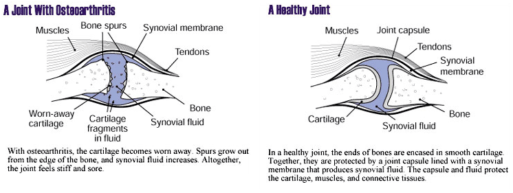
Credit: verywell.com
Osteoarthritis is a painful, debilitating disease that primarily impacts older adults. Although it is not a life-threatening illness, its symptoms can have a serious impact on quality of life. Most osteoarthritis sufferers have some degree of functional impairment. For many, simple activities such as walking, dressing, bathing and preparing meals are difficult to perform. What’s more, they are almost always accompanied by a significant amount of pain.
The U.S. Centers for Disease Control and Prevention estimates that there are 30 million people in the United States living with osteoarthritis as of 2017. Nonetheless, there are few effective treatments for this pervasive disease. Lifestyle modification, such as losing weight and becoming more physically active, are effective to a degree. But for many arthritis sufferers, these strategies offer little relief. What’s more, the medicines doctors typically recommend to treat arthritis pain can cause significant and even fatal side effects.
But there’s promising news on the horizon. A new study out of Belgium has shown that pharmaceutical-grade chondroitin sulfate, a natural substance found in animal cartilage that has few known side effects, may be just as effective as medication in reducing osteoarthritis pain.
Common Treatments Can Be Dangerous
The medical management of moderate to severe osteoarthritis usually involves the use of nonsteroidal anti-inflammatory drugs. These include over-the-counter medications such as ibuprofen, (Advil) naproxen (Naprosyn) and aspirin. If these prove ineffective, a doctor may prescribe stronger NSAIDs, such as celecoxib (Celebrex), diflunisal (Dolobid) or nabumetone (Relafen).
Unfortunately, NSAIDs can have major, even life-threatening side effects. The most common of these are stomach ulcers and major gastrointestinal bleeding. And while newer versions of traditional NSAIDs, known as Cox-2 Inhibitors, diminish this risk, they significantly increase the risk of heart attacks and strokes. In fact, the Food and Drug Administration estimates that the Cox 2 Inhibitor Rofecoxib (Vioxx) contributed to nearly 30,000 heart attacks from the time it was introduced in 1999 until it was taken off the market in 2004.

Credit: National Institute of Arthritis and Musculoskeletal and Skin Diseases
At about the same time that sales of Vioxx were discontinued, the FDA determined that a similar drug, celecoxib (Celebrex), had a moderately better safety profile and was less likely to cause cardiovascular events. As a result of that determination, Celebrex is still in use today. But, like all NSAIDS, it now carries a “black box” warning that tells users that even short-term use can lead to heart attack or death.
Chondroitin Compares Favorably to Celebrex
For several decades, many companies have marketed chondroitin as an aid to improving joint health. But because chondroitin is not technically a medication, the quality and purity of the various formulations vary enormously. And so, not surprisingly, does their efficacy.
To eliminate this variability, the Belgian researchers used pharmaceutical grade chondroitin, which is subject to stricter regulatory controls than its nutraceutical grade counterparts. They recruited 604 subjects from five European countries who had knee osteoarthritis and randomized them to receive either 800 milligrams of chondroitin sulfate or 200 milligrams of Celebrex or a placebo each day. After six months, they assessed the subjects using a 100-mm visual analog scale. They also asked patients to rate their pain and physical function using a different scoring model, the Lequesne Index.

Chondroitin sulfate is usually made from shark, cow, pig or chicken cartilage.
Credit: vietjet.net
On the visual analog scale, patients who received chondroitin had a score of -42.6 mm, compared to -39.5 mm for those who took Celebrex. The placebo group had a score of -33.3 mm. There was no statistical difference between the two “active” groups, but the difference between those groups and the placebo group was statistically significant. The results on the Lequesne scale were nearly identical: -4.7 for the chondroitin group; -4.6 for the Celebrex group and -3.7 for those taking a placebo.
Pain Relief Without Toxicity?
According to Jean-Yves Reginster, M.D., who led the Belgian study, these results are good news for osteoarthritis sufferers everywhere. In a statement accompanying the report in the Annals of Rheumatic Diseases, he said:
“This compelling benefit-risk profile, in light of the known clinical risks associated with chronic usage of NSAIDs underscores the potential importance of pharmaceutical-grade chondroitin sulfate in the management of knee OA, especially in this older population requiring long-term treatment.”
If you suffer from painful symptoms of osteoarthritis, ask your healthcare provider to recommend a pharmaceutical-grade brand of chondroitin. It may or may not work for you, but it appears that it’s worth a try. And if it does, it’s possible that in six months you may be able to throw your other pills away.

 Relief from Osteoarthritis Pain Without Drugs?
Relief from Osteoarthritis Pain Without Drugs?


 The Spiritual Symbolism of Cardinals
The Spiritual Symbolism of Cardinals
 Meaning-Focused Grief Therapy: Imaginal Dialogues with the Deceased
Meaning-Focused Grief Therapy: Imaginal Dialogues with the Deceased















